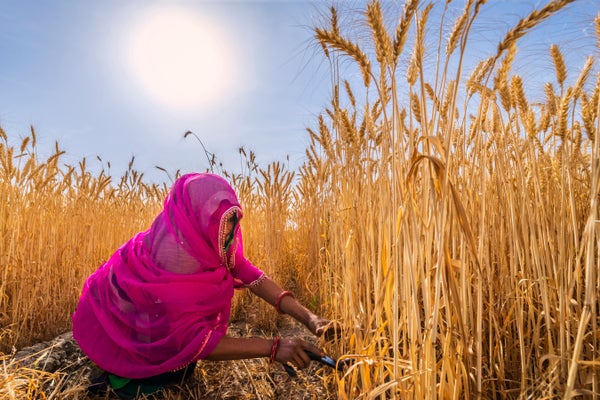CLIMATEWIRE | Women are disproportionately burdened physically and financially by extreme heat, and those impacts are expected to increase as climate change accelerates.
A new report looks at heat impacts on women across India, Nigeria and the United States, and finds that high temperatures cost women in those countries $120 billion annually, due largely to missed work hours.
When unpaid domestic labor is accounted for, the financial losses from heat borne by women rises to 260 percent compared to 76 percent for men, exacerbating existing gender disparities, the report says.
On supporting science journalism
If you're enjoying this article, consider supporting our award-winning journalism by subscribing. By purchasing a subscription you are helping to ensure the future of impactful stories about the discoveries and ideas shaping our world today.
That has ripple effects on family health, income and women’s education, but they’re not accounted for in economic data and often go unnoticed by policymakers, it states.
“We know that communities with women doing as well as men, they all do better. And so this [report] puts some hard numbers on what those inequalities are and how climate-driven heat is exacerbating them," said Kathy Baughman McLeod, director of the Adrienne Arsht-Rockefeller Foundation Resilience Center, which wrote the report. "Overall what it tells us is that extreme heat is pushing women in poverty further into poverty and pulling women that have come out of poverty back into it."
The report comes as temperature records are being broken around the world, and as countries and communities grapple with how to respond.
"They make it super clear that just thinking about extreme heat impacts on people writ large is not enough, and it really needs to be unpacked so we understand how different groups of people are affected," said Rebecca Carter, an expert on climate resilience at the World Resources Institute who was not involved with the report. "Once information like this is brought to light, we can think about ways to make some of the interventions better fit the needs of women."
Globally, women earn less than men and face other barriers to economic equality. Many women in lower-income countries work in informal sectors that lack labor protections such as fair wages, paid sick days and health insurance. They tend to also do the bulk of domestic chores, such as cooking, cleaning and collecting water.
Much of that work exposes women to high temperatures.
“While women tend to spend less time than men working outdoors, 4 percent of women’s working hours are in air-conditioned environments in Nigeria and only 9 percent in India,” the report states.
Extreme heat increases the time it takes to complete tasks by putting stress on the body, leading to headaches, fatigue, impaired movements and reduced concentration. Women who work outdoors may experience rashes, urinary tract infections or miscarriages, the report finds. Women in India and Nigeria work 90 minutes and 150 minutes more per day, respectively, when extreme heat strikes.
The loss of productivity reduces women’s income by limiting the time they can put into paid work and inhibiting their ability for economic advancement. As with most climate impacts, poorer, more marginalized women suffer greater losses than wealthier ones.
In India, women lose 19 percent of their paid working hours to heat, while Nigerian women lose nearly five hours of paid work each week. Heat also depresses many women’s wages in sectors such as agriculture, construction and other services.
Women in India “have lower incomes, more working hours and exacerbated health risks because of heat,” the report states. And when the heat rises, women are forced to choose between staying home without pay or going to work in heat that puts their health at risk. The same is true in Nigeria, where women earn around 40 percent less than men.
Climate change is expected to lower productivity as heat waves increase.
“Without action to reduce emissions or adapt to climate impacts, the average daily hours lost to heat are set to increase by 30 percent by 2050,” the report states.
Those losses impact a country’s overall economic growth — costing around $16.8 billion in the U.S. every year, $37 billion in Nigeria, and $67 billion in India. They can also push women further toward the financial margins and exacerbate existing inequalities, such as greater health risks than men.
That imposes a double burden on women, who tend to care for family members who are experiencing heat-related illnesses.
“The unequal division of domestic and care labor must be addressed to close the global gender gap," the report states.
Reprinted from E&E News with permission from POLITICO, LLC. Copyright 2023. E&E News provides essential news for energy and environment professionals.
